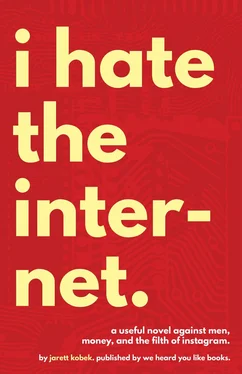It was about a junkie alien who sang lead vocals in a post-post-post-post-post-post-post-post-post-post-post-post-post-post-post-post-post-post-post-post-post-post-post glam band at the Pyramid Club on Avenue A.
Baby’s first novel was titled Trapped Between Jupiter and a Bottle . It was about a private eye in the future.
His second novel was titled Saving Anne Frank. It was about a time traveler who saves Anne Frank from Auschwitz and the Planet of Ashes.
Baby’s first two novels had experienced some critical success.
There was something in his prose construction that was more literary than the average practitioner of Science Fiction, which lead to misinterpretations of his genre tropes as postmodern devices.
In 2001, Jonathan Franzen published The Corrections, his good novel about people from the American Middle West without much eumelanin in their epidermises. They suffer from serious problems and a complicated family.
The Corrections arrived with great critical acclaim and massive commercial success. Baby took stock.
He too was from the American Middle West and, like Jonathan Franzen, he too lacked much eumelanin in his epidermis.
He was a young novelist of some critical reputation.
He was interested in leaving Science Fiction behind.
Baby decided that he too would write his own book about people who lived in the American Middle West. All of his characters would lack eumelanin in their epidermises.
He too would chronicle important problems and complicated families.
The resulting novel was the first instance of Baby writing fiction that wasn’t about robots or aliens or time travel. The resulting novel was about a family in Milwaukee.
The patriarch worked in steel. The mother was on amphetamines. One son was attracted to danger. Another son was attracted to men. One daughter was attracted to men and to danger. Another daughter had an abortion.
Baby titled the book Hot Mill Steam.
It bombed.
After the failure of Hot Mill Steam , Baby knew that he’d be stuck in Science Fiction forever. So he wrote a new novel of Science Fiction.
The average length of a novel is about 80,000 to 85,000 words. Trapped Between Jupiter and a Bottle and Saving Anne Frank were relatively short, both clocking in at roughly 70,000 words.
Hot Mill Steam was 150,000 words.
Baby had wanted to capture everything about having a lack of eumelanin in the American Middle West. All the suffering and joy that comes with being the color of a newborn piglet!
The bad novel that you are reading is about 72,900 words long.
When Baby started his new Science Fiction novel, he found that he could not shake the long-winded bullshit of Hot Mill Steam.
Long-winded bullshit was now in his blood. Long-winded bullshit had become part of his style.
The new novel was about 175,000 words.
Baby titled it Annie Zero .
The title was also the name of the book’s protagonist, a French Neo-Maoist in the far flung future. The name was a pun on the French phrase année zéro , which meant Year Zero, suggesting that once Annie Zero instituted her neo-Maoist cypherpunk revolution in the Megaverse, the calendar would be reset.
As part of his long-winded bullshit, Baby fell into a genre trope that he had avoided in his first two novels.
He started inventing new words.
This was a common habit amongst Science Fiction writers. They couldn’t help themselves. They were always inventing new words.
Perhaps the most famous example of a Science Fiction writer inventing a new word occurs in Robert Heinlein’s Stranger in a Strange Land . Part of Heinlein’s vision of horny decentralized alien sex involves the Martian word grok.
To grok something is to comprehend that something with effortless and infinite intuition. When you grok something, that something becomes a part of you and you become a part of that something without any troublesome Earthling attempts at knowing.
A good example of groking something is the way that members of the social construct of the White race had groked their own piglet pink.
They’d groked their skin color so much that it became invisible. It had become part of them and they had become part of it. That was groking.
People in the San Francisco Bay Area, especially those who worked in technology like Erik Willems, loved to talk about groking .
With time, their overusage stripped away the original meaning and grok became synonymous with simple knowledge of a thing.
In a weird way, people in the Bay Area who used the word grok did not grok the word grok.
Baby had always been popular with people on the Internet, which was a wonderful place to deny climate change, willfully misinterpret the Bible, and denounce Darwin’s theory of evolution.
Now that Baby had coined nonsense neologisms, he had become more than popular. He had become quotable.
Annie Zero was Baby’s best selling book. Annie Zero was why Erik Willems approached Adeline at a dinner party.
He recognized her from a photo which accompanied an interview she’d done with the SF Weekly. The interviewer, a guy named Evan Karp who didn’t have much eumelanin in the basale layer of his epidermis, had asked Adeline about her friendship with Baby.
Adeline spilled the beans.
One of the reasons why Adeline liked San Francisco was that it retained a high degree of sexual freedom. She often said it was the last place in America where a person needed only 48 hours’ notice to arrange a threesome with a baby crocodile and a pygmy dwarf.
Like many things in San Francisco, this high degree of sexual freedom curdled when adopted by straight people of the upper middle class.
Straight people of the upper middle class who’d adopted this high degree of sexual freedom had the bad habit of recommending books like The Ethical Slut: A Guide to Infinite Sexual Possibilities and Stranger in a Strange Land.
Adeline was at the dinner party in question because she’d been invited by her friend Christine. Christine had disappeared, saying that she was going to powder her nose.
In Breakfast at Tiffany’s, going to the powder room is a euphemism for the exchange of money between the female sex-worker and her clients. Christine was not a sex-worker. She really was powdering her nose.
She left Adeline sitting beside a middle-aged straight couple.
Adeline herself was middle-aged but was always surprised by the middle-agedness of others.
She still felt young, even if she’d been dyeing her hair for two years.
When she was in high school and college, Adeline had gone through a range of hairstyles and colors roughly coincident with her participation in a wide span of subcultural identities.
Her hair then had been every color other than grey, the color that she now hid beneath an unnatural black hue.
The middle-aged straight couple told Adeline about their non-traditional sexual lifestyle, about how it had liberated them from the institutional shackles of monogamy and shown them a new kind of happiness derived from basic human biology. The woman in the couple insinuated that she was adept at the usage of strap-on dildos.
Adeline listened, waiting for Christine, and wondered which of the following conversational turns was most likely: (1) A discussion of the differences, if any, between an open relationship and being polyamorous. (2) The recommendation that she read The Ethical Slut. (3) Someone using the word grok. (4) The suggestion of a threesome, with an offer to host if Adeline felt uncomfortable having the liaison at her place.
Читать дальше












